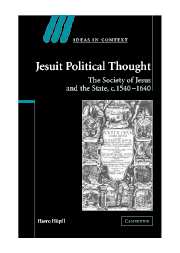Book contents
- Front Matter
- Contents
- Acknowledgements
- List of abbreviations
- Translations, references, and orthography
- Introduction
- 1 The character of the Society of Jesus
- 2 The Society's organisational ideas
- 3 The Society and political matters
- 4 The Church, the Society, and heresy
- 5 The confrontation with reason of state
- 6 Reason of state and religious uniformity
- 7 Jesuit reason of state and fides
- 8 Reason of state, prudence, and the academic curriculum
- 9 The theory of political authority
- 10 Limited government, compacts, and states of nature
- 11 The theory of law
- 12 The common good and individual rights
- 13 Tyrannicide, the Oath of Allegiance controversy, and the assassination of Henri IV
- 14 The papal potestas indirecta
- Conclusion
- Bibliography
- Index
- IDEAS IN CONTEXT
11 - The theory of law
Published online by Cambridge University Press: 22 September 2009
- Front Matter
- Contents
- Acknowledgements
- List of abbreviations
- Translations, references, and orthography
- Introduction
- 1 The character of the Society of Jesus
- 2 The Society's organisational ideas
- 3 The Society and political matters
- 4 The Church, the Society, and heresy
- 5 The confrontation with reason of state
- 6 Reason of state and religious uniformity
- 7 Jesuit reason of state and fides
- 8 Reason of state, prudence, and the academic curriculum
- 9 The theory of political authority
- 10 Limited government, compacts, and states of nature
- 11 The theory of law
- 12 The common good and individual rights
- 13 Tyrannicide, the Oath of Allegiance controversy, and the assassination of Henri IV
- 14 The papal potestas indirecta
- Conclusion
- Bibliography
- Index
- IDEAS IN CONTEXT
Summary
In Jesuit political theory, then, legitimate government was limited government. Even those Jesuits who had no political reasons for wishing to see those limits take institutional form found it difficult to resist the conclusion that they must be enforceable at least as a last resort. But this should not be allowed to create the impression that the Society was an order of constitutionalists avant la lettre. On the contrary, the Society's constitutive beliefs about order made it difficult to distinguish between just resistance to lawful authority and insubordination, or to conceive of legal means by which rulers might be restrained. Our account of the structure of the Society itself and of its understanding of the Church made this evident enough. It is equally apparent in its conception of law.
Jesuits certainly could never have conceived of a well-ordered polity, or indeed a well-ordered communitas or societas or ordo of any kind, which was altogether devoid of laws. The Society's own manner of government generated constitutiones, regulae communes, instructiones, house-rules, etc., ad infinitum. Nevertheless, everything that we have said about the Society demonstrates that for Jesuits, what constituted and maintained polities and associations was not laws but principatus, in other words permanent and reliable relationships of command and obedience. Indeed, the preoccupations of princes at this time, emblemised by reason of state, usually revolved around the conduct of foreign policy, the maintenance of their own power and authority, and domestic or imperial administration.
- Type
- Chapter
- Information
- Jesuit Political ThoughtThe Society of Jesus and the State, c.1540–1630, pp. 263 - 282Publisher: Cambridge University PressPrint publication year: 2004



